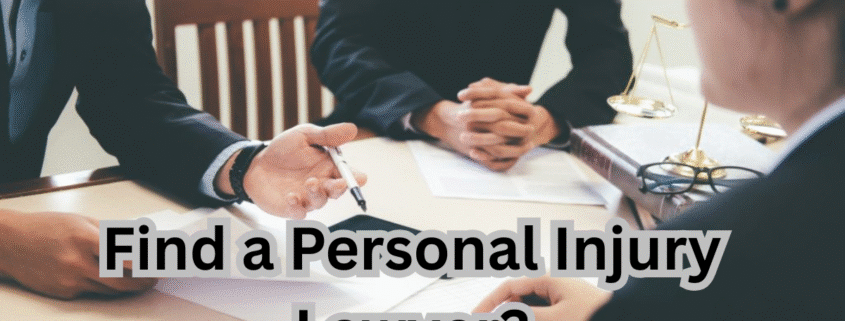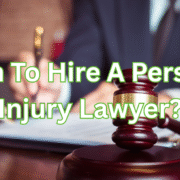How To Find a Personal Injury Lawyer?
The crash came out of nowhere. One second, you were crossing Main Street under a green light; the next, a delivery van tore through and sent you spinning. Sirens, stretcher, hospital lights, then the real trouble began. You had a mountain of bills to pay, you missed work, and the driver’s insurer kept calling with a “quick check” that would barely cover the ambulance ride.
Friends told you, “Hire a personal injury lawyer,” yet the thought adds new worries:
- How much will it cost?
- Who is honest?
- What is even the best place to start?
Whenever you feel any of this, take a deep breath. This guide is built for regular Utah families who suddenly find themselves hurt and unsure. It breaks down the search for legal help into simple, bite-sized steps, a road map you can follow while still healing.
You’ll learn the ground rules that shape injury claims in our state, reasons you may or may not need an attorney, and then tested moves that lead to the right one. Every section uses plain words, real facts, and examples drawn from local courts. After reading this article about how to find a personal injury lawyer in Utah, you’ll know exactly what to do next, and you’ll feel in control again.
What You Need to Know?
- Utah’s injury deadline is four years
- Notice to cities or the state can be far shorter
- You might still pay record or expert costs
- Insurance adjusters begin defense work day one
- Written proof beats memory in any courtroom
- Social posts can gut the value of a claim
- Gaps in treatment lower settlement offers
- Future medical needs must be stated in writing
- More than one insurance policy may be in play
Do You Actually Need a Personal Injury Lawyer?
Life throws many bumps. Not all of them demand legal firepower.
Consider these questions:
- Surgery is necessary for broken bones
- Injury leaves scars or lasting limits
- More than one party may be at fault
- A crash involves a big truck or bus
- City, county, or state vehicle caused harm
- Child hurt with future care needs
- The insurance check seems far too small
- The adjuster blames you without proof
If one or more points fit, a lawyer can guard your rights. But even if none apply, a short, free call with a firm can be smart insurance. A clear answer now may spare months of stress later on.
Step-by-Step Process for Finding the Best Personal Injury Lawyer in Utah
Choosing legal help should feel orderly, not rushed. Follow the ten moves below, each builds on the last. Take notes, trust your gut, and you’ll land the best injury lawyer near you who treats you with respect and fights hard for fair money.
Ask Trusted People and Health-Care Pros
Start close to home. The physical therapist in your office, your coworkers, or even your church members have all experienced a crash or fall before.
Ask three plain questions:
- Did the lawyer keep them updated?
- Was the final check enough to cover bills and worries?
- Would they hire that lawyer again?
These real-life stories cut through fancy ads. Medical providers also see which firms pay liens on time and avoid delaying treatment. Gather at least three names. Write down phone numbers, plus any praise or warnings you hear. This first pool of leads often includes one hidden gem you would never spot on a billboard.
Verify License and Discipline History
Next, search “Utah State Bar attorney lookup. Type each name. You’re looking for “Active” status and zero public discipline. Click any links that mention suspension, probation, or trust-account trouble. A clean sheet means the lawyer follows court rules and handles client funds properly. One old parking ticket won’t matter; repeated lapses are another story. This five-minute check protects you from someone who might mishandle settlement money or miss filing dates.
Read Reviews and Study Past Results
Move online to find the best personal injury lawyer in Utah. Google, Avvo, and Martindale-Hubbell list client ratings and peer feedback. Do not judge by stars alone; read clusters of comments. Praise for clear updates and fair net payouts is gold. Repeated gripes about phone calls going unanswered are a red flag. Now visit each firm’s website or local news articles. Make sure the wins match cases like yours, not unrelated business disputes.
Check Focus on Injury Law and Courtroom Skill
Some attorneys draft wills one day and chase car claims the next. You need a shop that spends most days on injury work. Deep focus means they know the local judges, medical coding rules, and the tricks adjusters use to shrink payouts.
Ask:
- What share of your practice is accident cases?
- How many lawsuits did you file last year?
- How many trials did you finish?
Insurers track which firms are ready to put a case before a jury. Lawyers feared in court often land higher settlements because carriers want to avoid that risk. A busy courtroom calendar is a strong sign of real muscle, not just talking points.
Nail Down Fees and Costs
Nearly every personal injury lawyer in Utah works on contingency. Typical fee: one-third of the recovery, rising to 40% if the suit reaches trial. But that’s only part of the story. Court filing fees, medical-record charges, and expert bills often run thousands. Some firms advance these and deduct them from the final check; others send monthly cost invoices to clients. Get clarity in writing. Ask for a sample closing sheet showing how a $100,000 settlement might break down.
Meet Face-to-Face for a Free Consultation
Even in the video-call age, an in-person talk tells you more than any website. On arrival, note how the staff treat you. Are they warm and organized? In the meeting, watch the personal injury attorney’s eyes. Is it focused on you, or drifting to email? Bring a folder: police report, photos, pay stubs, and every medical record you have. See if the lawyer flips through each page or sets the stack aside. Careful review shows respect and hints at future work ethic. A lawsuit could last years; choose the person whose office feels like a safe harbor, not a sales floor.
Compare, Reflect, and Choose
Never sign with the first lawyer unless you have checked at least one more. Each consult reveals fresh angles: a shorter deadline against a city bus, an umbrella policy on the negligent teenager’s parents. Type or hand-write the answers you receive to key questions, fees, expected timeline, likely hurdles, and who handles routine calls. Sleep on it. The next morning, review your notes and gut feeling. One final tip: search “Personal Injury Lawyer Utah” once more with that name to spot any late-breaking news before signing. A few extra minutes can spare months of regret.
Consult an Experienced Personal Injury Attorney in Utah
If you need honest guidance right now, reach out to Cockayne Law in West Jordan. Founder Chris Cockayne grew up along the Wasatch Front, served on church safety boards, and has spent years helping crash victims reclaim lost wages and cover lifelong care. Calls and texts are returned within one business day.
The firm advances court costs, so you pay nothing unless money comes in for you. Clients say they like the clear status emails and the way paralegals keep paperwork off their kitchen tables. To set up a free talk, call (801) 268-2491 or submit the short form on the website. Before the day’s end, a team member will outline fair options and hand you a simple list of next moves, no pressure, just facts.
Final Thoughts
Hiring a lawyer is not about going after a jackpot; it’s about protecting your health, your family budget, and your peace of mind. Call trusted voices to ask for recommendations, take a look at licenses, read real reviews, and meet in person. Uncertainty quickly turns into certainty with a clear plan. Yes, the road ahead may still include doctor visits and paperwork, but the right attorney shoulders the legal weight so you can focus on getting better.
Act soon, though. Utah’s four-year filing clock starts ticking the day you were hurt, and if a city snowplow was involved, you may have only one year to give written notice. Delay helps only the insurance company.
Pick the lawyer who listens first and talks straight, and guarantees regular briefings. It doesn’t matter whether you choose a big downtown firm or a small, focused team like Cockayne Law: a committed, caring personal injury attorney can make a big difference in your life.
FAQs
How do I find the best personal injury attorney?
Look up licenses, read clusters of client reviews, ensure that the firm specializes in injuries, and compare payouts awarded for injuries similar to yours. Talk to at least two lawyers, ask how they’ll communicate with you, and go with the one who offers a straightforward plan in plain English.
How difficult is it to prevail in a personal injury lawsuit?
Winning involves clear evidence of fault, good medical records, and reasonable damage numbers. Simple rear-end collisions frequently settle before trial. Other cases with shared fault or previous health problems also take longer and might require a courtroom verdict.
What is the average compensation amount in a personal injury claim?
Soft-tissue injuries can be settled for a few thousand dollars. A broken leg surgery usually checks in at the low six figures. Life-altering brain or spinal injury can be seven figures. Medical bills, lost wages, and the projected cost of future care all power the final number.
What should I do to get ready for the first consultation?
Do bring the police report with photos, medical bills, a list of doctors, pay stubs reflecting lost wages, and any insurance letters. By organizing these papers, the lawyer can determine her case strength at a glance and save time when opening your file.
What will I want to find out during the consultation?
Ask who will be returning routine calls, how frequently you will be given progress reports, what expenses you may be responsible for if you lose the case, and, if talks fail, whether the firm is prepared to file suit.
What is the average length of time for personal injury cases?
Basic claims with clear fault can be settled in three to six months. Complicated cases involving extended care, more than one insurance company, or expert testimony usually require 18-24 months. If it goes to a jury trial, you are looking at two to three years because court dockets are always full.

















